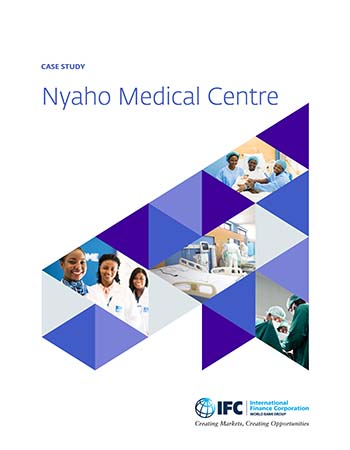For 51 years, Ghana’s oldest group medical practice has balanced the twin goals of supporting public health and managing a viable business. In 2020, its capabilities were put to the test by the Covid-19 pandemic. Nyaho Medical Centre became an active participant in the country’s response. It provided rapid testing and treatment, helped organize public health measures such as contract tracing, and developed innovative practices in telemedicine. Nyaho also embraced the use of digital health records to reduce waiting time, coordinate patient services, and to support the effective management of hospital staff. In all these ways, Nyaho Medical Centre demonstrated the resilience and responsiveness necessary for healthcare enterprises facing new global challenges such as the COVID-19 pandemic.
Nyaho’s commitment to public health and innovative quality care is not new. In 1970, Kwami Nyaho Tamaklo, M.D., founded a full-service private medical facility located in the capital city, Accra. Inspired by the example of the Mayo Clinic, Tamaklo insisted that the new hospital have an explicit focus on prevention, public health, team-based patient care, and evidence-based practices. Nyaho is a family business, currently managed by the founder’s son Elikem Tamaklo, M.D. but it is also designed to evolve into an independent, non-family-controlled enterprise, if necessary.
In 2020, Nyaho began implementing a new strategic growth plan, developed with IFC’s guidance and funded by a $5.2 million loan. The plan involved a hub and spoke strategy, in which the central hospital would focus more on specialized treatment, testing, and inpatient care. Outpatients would visit their doctors at clinics or virtually. There would also be more specialized facilities, such as a maternal and pediatric care unit, opened in January 2020 at the main campus, and an urgent care center in the nearby city Tema, currently planned to open later in 2021.
When the pandemic struck, Nyaho’s proactive approach to medical testing and treatment enabled it to play an important role as a trusted advisor to Ghana’s government on pandemic response.
The Nyaho example demonstrates what a private healthcare provider can do to create a central position for itself and a reputation for excellence and innovation.
The following interviews with Dr. Elikem Tamaklo and the company’s marketing and operations leaders are in their own words.
Timeline
Lessons
From the beginning, Nyaho’s founding family was conscious of the legacy they were building.
The hospital is investing in ongoing upgrades of its technology and its practices to align with expected quality practice.
Preventative care and broader issues are core priorities.
Physicians (in a team-based approach) and all employees learn from experience.
Nyaho gains trust by being “reliable, authentic, skilled, and kind.”
Conclusion
In several IFC case studies of healthcare companies, the idea of “living by values” is prominent. Successful companies in this sector in emerging economies are often under pressure to balance their commitment to people with their need to stay profitable as a business. A company like Nyaho Healthcare Ltd. must internalize this commitment. In a situation like a pandemic, the difficulty of living by values becomes apparent. The actions of the institution’s leaders—and all its employees—are thrown into sharp relief. Healthcare businesses around the world have all been tested. Nyaho’s story shows how these tests, and the response to them, establish a business’ reputation and its potential for success in the future.

Read Full Case Study
DOWNLOAD
